Welcome to our post election bulletin. This edition includes:
- An overnight snapshot of the results
- Labour’s victory
- Humiliation for the Conservatives
- Minor party highlights
- Seat by seat breakdown
- What happens next – key dates
- Highs and lows from the campaign in pictures
What you missed overnight – a snapshot
- Labour wins in a landslide with Sir Keir Starmer promising to govern for the whole country. With more than 500 out of 650 seats declared (at the time of writing), Labour is projected to form the next government, with a majority of 166.
- The Conservative’s majority is left in tatters having lost a huge number of seats throughout the country. The Tories are set for the worst result in their history, with just 136 MPs.
- 36 ministers have lost their seats.
- The Scottish National Party is now forecast to be reduced to eight MPs, as Labour regains dominance in Scotland.
- The Liberal Democrats are benefitting from a collapse in Tory support and are predicted to get 56 MPs.
- Nigel Farage has won the seat of Clacton, on his eighth attempt to become an MP. In total, four Reform MPs have been elected, including Richard Tice and Lee Anderson.
- The BBC revised the exit poll at 3.40am to predict Labour would win 405 seats, securing a majority of 160 to the Conservatives’ 154.
Labour have won the election in a landslide.
- Waiting for a political candidate or party who perfectly reflects your political views in order to vote for them is giving up any power you have to influence elections until then and allowing the rest of the country to choose for you. Why wait for a “good enough” option when you could be voting for the “least bad” option or voting tactically to prevent the “worst” option?
- A rejected ballot can be difficult for politicians to interpret, as your message is not necessarily clear or acknowledged by the results.
- Your vote could be awarded to a candidate unintentionally! In 2015, Glyn Davies MP was given a vote because the drawing of a phallic symbol fit within the confines of his box on the ballot paper.
- There are other ways to protest including lawful demonstrations, publicised campaigns, writing to your elected politician or setting up your own political party.
Labour have won the election in a landslide.
Labour, led by Sir Keir Starmer, has won a sweeping victory. The Conservatives, after 14 years in government, have been defeated.
Sir Keir Starmer is jubilant this morning, having transformed his party into an electable force. At the time of writing, Labour are on their way towards a massive majority, with the exit poll suggesting they will win over 400 seats.
Labour have won previously safe Tory seats right across the country. Their gains are largely on the back of a dramatic decline of 21 points in Conservative support. Starmer’s victory marks a huge turnaround for the party, four and a half years after he took over as leader and less than five since Jeremy Corbyn led the party to a disastrous defeat, its worst result since the 1930s.
It appeared to have fallen just short of Tony Blair’s historic 1997 win in which Labour won 418 seats and a majority of 179 . Starmer, like Blair, fought a campaign promising change after more than a decade of Conservative rule.
Speaking at his election count, a beaming Starmer said: “People here and around the country have spoken and they’re ready for change, to end the politics of performance and return to politics as public service.
“Across the country people will be waking up to the news relieved that a burden has been lifted, a weight lifted from the shoulders of this great nation. The sunshine of hope is returning to our great country.”
However, Labour’s victory was not without some losses as two Labour frontbenchers have lost their seats. Jonathan Ashworth lost Leicester South in a shock defeat to a pro-Gaza independent, while Thangam Debbonaire, the shadow culture secretary, has lost Bristol Central to Green party co-leader Carla Denyer.
It started in the rain, and ended in tears - Conservatives lose historic defeat but are the second-largest party in Parliament
Rishi Sunak’s Conservatives were left in tatters at 10pm last night when the exit poll was announced. Sunak has said he accepts responsibility for the Conservative Party’s historic general election defeat.
Former attorney general Sir Robert Buckland, the first Tory MP to lose his seat as results began rolling in, commented that the party was facing “electoral Armageddon”. The results did not get better for the Conservatives throughout the night. The exit poll also indicates the Conservatives have suffered a disastrous wipeout, losing dozens of seats they won for the first time in 2019 under Boris Johnson.
Three cabinet ministers have lost their seats: Grant Shapps, the Defence Secretary; Alex Chalk, the Justice Secretary, and Gillian Keegan, the Education Secretary. Simon Hart, the chief whip, has also lost his seat.
Senior Tories Jacob Rees-Mogg, Michelle Donelan, Penny Mordaunt, Johnny Mercer, Miriam Cates, Therese Coffey, Damian Green and Simon Clarke have all lost their seats. Jeremy Hunt, however, avoided becoming the first Chancellor in history to lose his seat, winning by 891 votes.
Minor parties highlights
- The Liberal Democrats are benefitting from a collapse in Tory support and are predicted to get 56 MPs, slightly fewer than the 61 predicted by the exit poll but still their best result since 2010.
- The rise of Reform, which split the rightwing vote, could pose a major challenge for an incoming Starmer government, which will have to devise a strategy to fight the rise of the hard right, a trend mirrored across Europe.
- Carla Denyer, co-leader of the Green Party of England and Wales, has beaten Labour in Bristol Central and her party is predicted to gain another seat to double their current number of MPs.
Seats breakdown
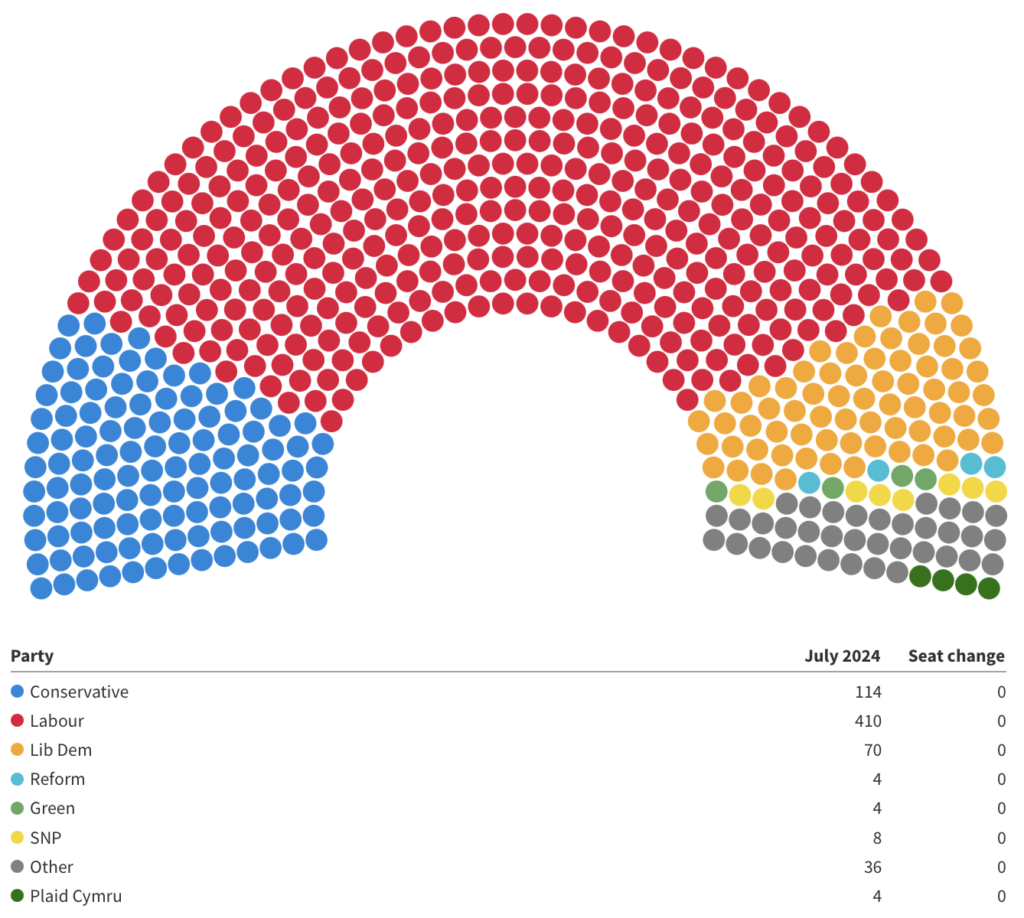
Spotlight on some seats that have turned:
- Clacton turns Reform. After 7 failed attempts, Nigel Farage will finally be to cross Parliament’s threshold and sit on the green benches. Clacton had previously given the Conservative party a bloody nose in 2015 when returning Douglas Carswell, but tonight’s result when matched with results from elsewhere show a party in deep trouble. Farage is perhaps the pre-emanant self-promoter in British politics, but with the continuous change of what being an MP means, will his bluster reach its end point quicker than if he had simply stayed on the sidelines? The wider support Reform has got in left behind seaside areas should be a wakeup call to both main parties, Labour should see it as an opportunity to muscle in on long held Conservative areas. Whilst the Conservatives need to work out how to restore trust in the areas that they promised so much but failed to deliver.
- One to watch: Chelsea & Fulham is set to swing to Labour which result in the demise of the Conservatives in central London. Since its inception, Chelsea and Fulham, along with the Cities of London and Westminster were blue gems in a sea of red. This morning, however they are to be swept up in the Starmer victory wave. Whilst the Conservatives lost seats in London during the Brexit years (Putney and Battersea being glaring examples), these seats remained. Whilst the majorities weren’t on a par with Sevenoaks and Tonbridge, both these seats represented the wider view of metropolitan Conservatism.
Spotlight on some seats that have turned:
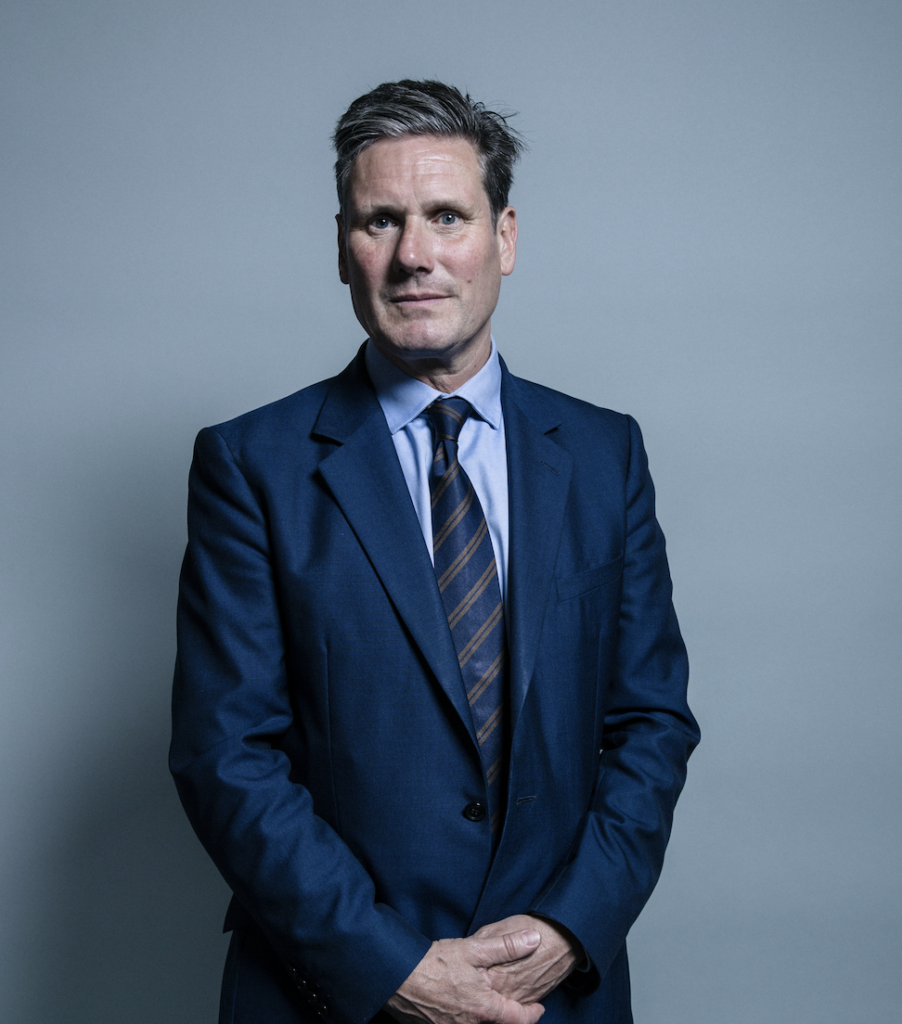
Keir Starmer
Prime Minister
MP for Holborn and St Pancreas from 2015. Labour leader since 2020. Served on and off in shadow positions under Jeremy Corbyn. Formerly the Director of Public Prosecutions from 2008-2013. Qualified as a barrister in 1987.

Rachel Reeves
Expected Chancellor of the Exchequer
MP for Leeds West since 2010. Formerly a Bank of England economist and retail banker at HBOS. Reeves will become the first female Chancellor in British history. Barring 6 months after she was first elected, Reeves has been in various shadow ministerial jobs and since Starmer was elected leader, she has been in the Shadow Cabinet.

Yvette Cooper
Expected Home Secretary
MP for Normanton, Pontefract and Castleford since 1997, formerly an Economics journalist, economic advisor to John Smith and spent time working in Arkansas for Bill Clinton in 1992. Cooper served in Gordon Brown’s cabinet as Chief Secretary to the Treasury and Secretary of State for Work and Pensions. She has also served as Shadow Home Secretary under 2 Labour leaders.
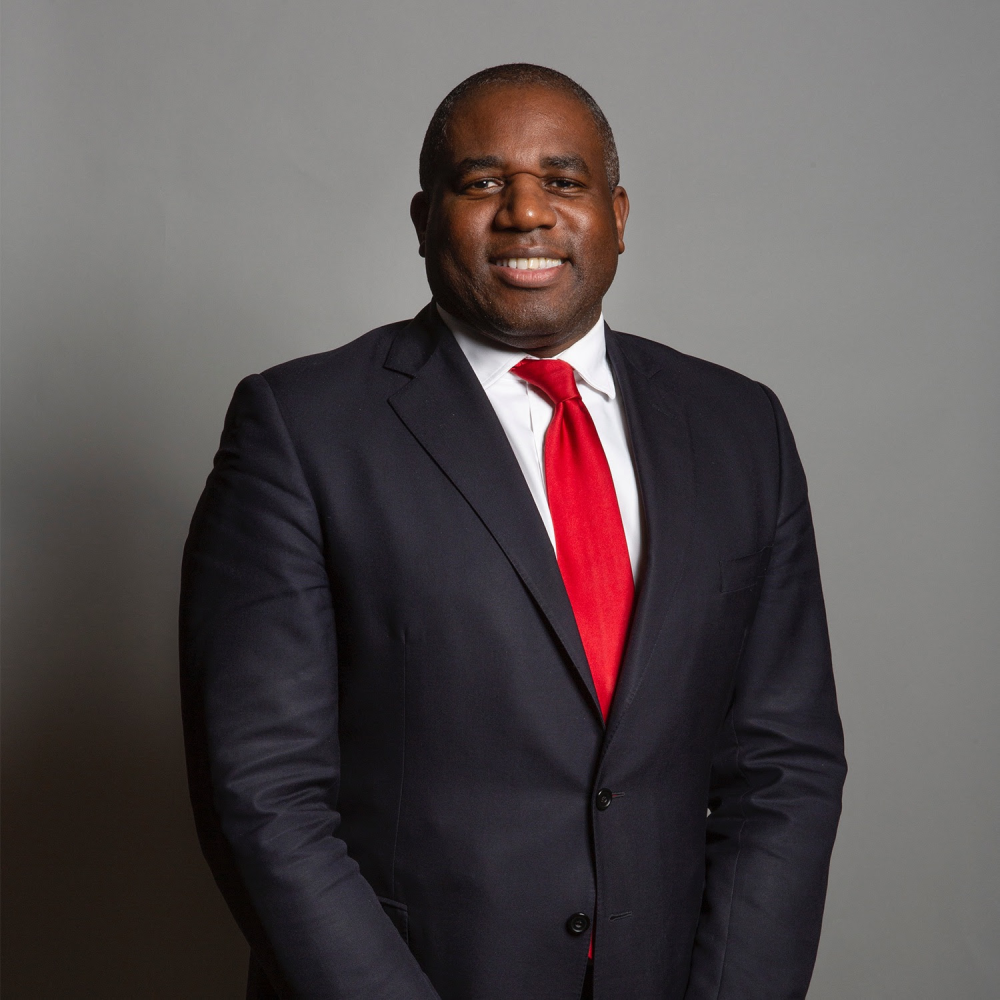
David Lammy
Expected Foreign Secretary
MP for Tottenham since 2000, formerly a lawyer in both the UK and America. Lammy became an MP following the death of Bernie Grant and served in various ministerial roles under Tony Blair and Gordon Brown and in opposition has taken several shadow portfolios. Lammy is known to have a good working relationship with Baron Cameron of Chipping Norton and has been traveling far and wide before the campaign, so expect a painless handover.
Your JBP Account lead will be in touch with more information relating to your portfolio.
What happen's next?
Key dates:
- This afternoon, the Prime Minister will meet His Majesty when he will be invited to form a government in his name. This will be a short meeting in which the Prime Minister will brief the King on his Government’s new priorities.
- Sir Keir will then meet the Cabinet Secretary, Simon Case and begin to appoint his ministers. We are expecting cabinet ministers to be in post at the end of Friday, with junior ministers to be appointed over the weekend.
- On 9 July, MPs will be sworn into form the new Parliament. The King’s speech is set to take place on 17 July, which will be the official start of the first Starmer government.
- Following this, on 24 July, the select committee memberships will be announced. Labour will get the vast majority of committees, but keep an eye out on who from the minor parties will get a chairmanship.
- It is expected that the coming summer recess will be a short one as Sir Kier will be looking forward to begin governing.
Interesting facts:
- Despite the Prime Minister’s and King’s first meeting being known as “Kissing hands” no hands will be kissed! MP’s must swear an oath to the King, which is why Sinn Fein do not take their seats in Parliament.
- The Chair of each select committee will join the Liaison committee whose job is to scrutinise the Prime Minister.
Amusing high point and low point from election in pictures
Election high points
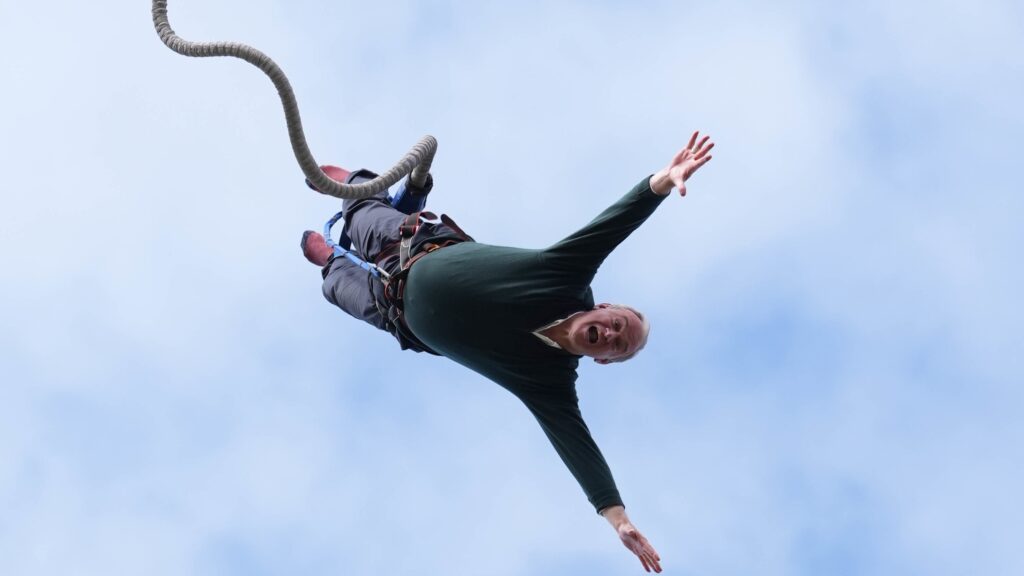
Election low points
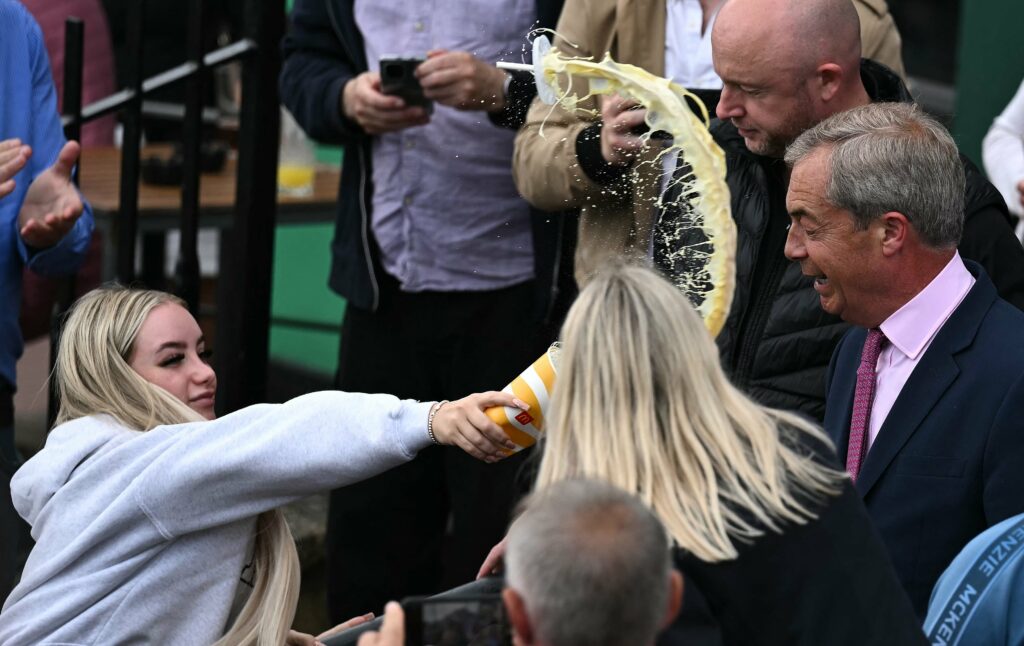
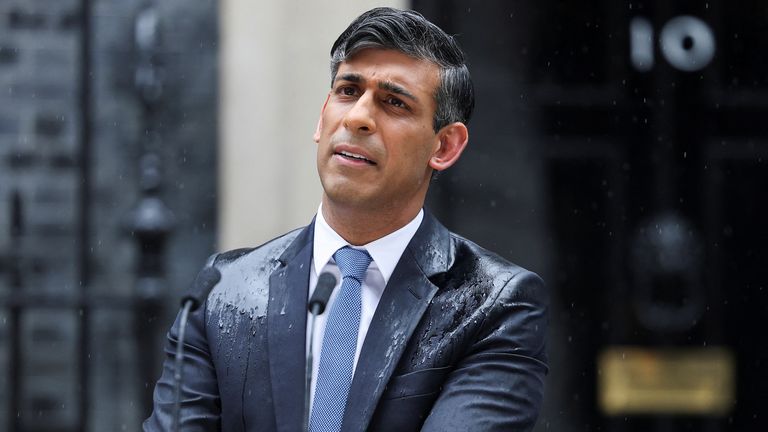
The cutest JBP dog at polling station – Rupert, Jennifer Bryant-Pearson's dog.
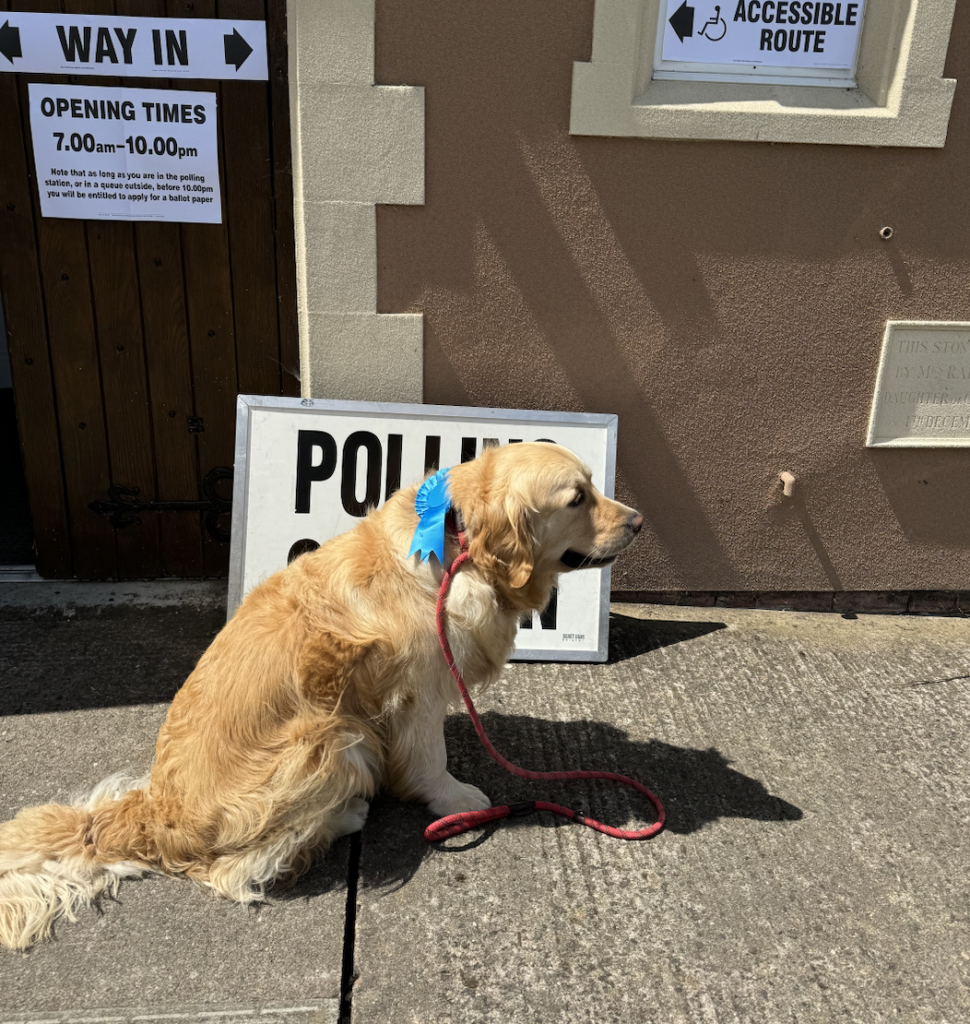

Kieran Bergholcs, leads JBP’s Westminster public affairs team and has 9 years’ experience in politics and policymaking. He currently advises clients on the rollout of digital infrastructure in rural areas, the rural economy and financial services reform, by regularly engaging with parliamentarians and decision-makers across both the House of Commons and Lords. He spent three years in the House of Commons working for Lord Goldsmith of Richmond Park and Mark Garnier MP. Prior to that, Kieran was an Advisor to Australian Prime Minister Malcolm Turnbull covering immigration policy, agriculture and disaster recovery.
